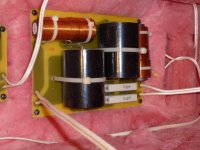The electronics-grade RTV silicones are too $$$ for me. If I use a standard acetic acid- or ammonia-cured silicone caulk (GE I or GE II, respectively), would I be hurting my MOX resistors, plastic-wrapped caps, or magnet wire?
I stuck my Crossover components down to a PCB using the standard DIY clear silicone sealant which I think was the acetic acid type stuff and 15 years later no problems. I didn't ecapsulate them I just stuck all the compoents down to prevent rattles.
The Crossover components were from Falcon Acoustics and used Polypropylene Capacitors. The inductors were just the standard rather crude ferrite rods wound with wire that self sticks together with heat I guess. From memory the resistors were just ceramic bodied.
The Crossover components were from Falcon Acoustics and used Polypropylene Capacitors. The inductors were just the standard rather crude ferrite rods wound with wire that self sticks together with heat I guess. From memory the resistors were just ceramic bodied.
FWIW I have used paraffin wax with quite some success... A small bonus is that if things go sideways or if you just want to switch out a component in the future all you need is heat.
I have seen the acetic acid based silicones turn copper coils GREEN over time.
I have seen the acetic acid based silicones turn copper coils GREEN over time.
I took the drive units out so I could see the crossover. The components have been stuck to the PCB with silicone sealant though it isn't obvious on the picture attached.
The silicone sealant isn't really in contact with the lead out wires so corrosion hasn't been a problem.
The silicone sealant isn't really in contact with the lead out wires so corrosion hasn't been a problem.
Attachments
- Status
- Not open for further replies.
